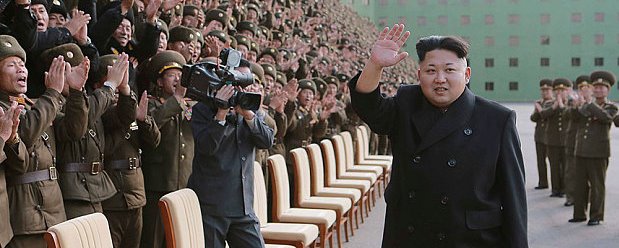The United Nations will hold a vote on Tuesday over whether Kim Jong-un should be prosecuted for crimes against humanity over North Korea’s appalling human rights record.
The UN General Assembly’s human rights committee will meet in New York to consider a motion to refer the North Korean dictator to the International Criminal Court at the Hague.
The move follows the publication of a UN report in February that found Pyongyang’s communist regime to be one of the cruellest in the post-war world, likening it to Nazi-era Germany or Pol Pot’s Khmer Rouge.
Compiled by Michael Kirby, an Australian judge, the report documented a vast network of harsh prison camps holding up to 120,000 people, along with cases of torture, summary executions and rape. Following its publication, Mr Kirby wrote to Kim Jong-un to warn him that he could ultimately face prosecution by the ICC, and requested him to take “all reasonable and necessary measures” to stop such horrors.
Mr Kirby told The Telegraph today that in the ensuing nine months, he had had no reply from the North Korean leader’s office.
However, today’s draft, which has been drafted by the European Union and Japan, has still rung alarm bells in the leadership of the hermit state. Recently, North Korea has campaigned to promote its human rights record and hinted at allowing a possible visit the country by UN human rights envoys. Pyongyang has also been seeking the help of allies – led by Cuba – who will make a separate bid today to get the UN resolution to drop its call for an ICC referral.
The amended resolution would simply call for greater cooperation on human rights with Pyongyang through fact-finding visits and talks with the UN rights office. Cuba, like a number of other nations with poor human rights records, fears that a referral of North Korea to the ICC could put its own leaders at risk too.
Calling for a vote in favour of the referral, Mr Kirby told The Telegraph: “The members of the United Nations should not, once again, turn away from the rights of the people of North Korea to have accountability for great crimes. Not now that the world has the report of the United Nations Commission. Now the world cannot say that it does not know what has been going on in North Korea.”
The resolution, which is co-sponsored by more than 50 countries and will be voted at 3pm British time, is expected to be approved by a strong vote of between 100 and 120 countries out of the 193 members of the United Nations. However, in practice, it is unlikely to lead to a prosecution, as the final say will be by the UN Security Council, where China, which is a long-term ally of Pyongyang, is likely to exercise a veto.
Pyongyang has dismissed the resolution as confrontational and the product of a plot orchestrated by the United States to discredit the regime and bring about its downfall.
Last month, North Korean officials held their first meeting in 10 years with the UN special rapporteur and extended an invitation for him to visit Pyongyang, while offering to cooperate with the UN High Commissioner on Human Rights.
But Mr Kirby said that North Korea’s “charm offensive” had only been started by the publication of the report, and should be treated with scepticism. “It (North Korea) has initiated a range of measures, astonishing only by contrast with the long time previous strategy of absolute refusal to engage with the UN over the allegations of violations of human rights,” he said. “But these new measures and words have not been shown to have improved the human rights of a single person in North Korea.”
He added: “If the case of (North Korea) is not, objectively, a case for referral to the Prosecutor at the ICC, it is hard to imagine a case that would be.”
North Korea has also been nervous enough to court Russia, another permanent council member, with high-level visits in recent weeks.
Prior to the main vote, diplomats will hear the Cuban amendment, which is expected to gain backing from a number of African countries that have bristled at the ICC’s focus on African war crimes cases.
Last week, Iran last week sent a note to members of the Nonaligned Movement, an organization of more than 100 developing countries that Iran leads, reminding them of their traditional stance against resolutions that target a single country. Syria, Bolivia and Venezuela are expected to go along with Iran, but other countries, including South Africa and Brazil, have not yet indicated how they will vote.
A trio of human rights groups – Human Rights Watch, Amnesty International and the Jacob Blaustein Institute for the Advancement of Human Rights – also called on U.N. member countries to support the resolution and “ensure justice for decades of terrible abuse.
